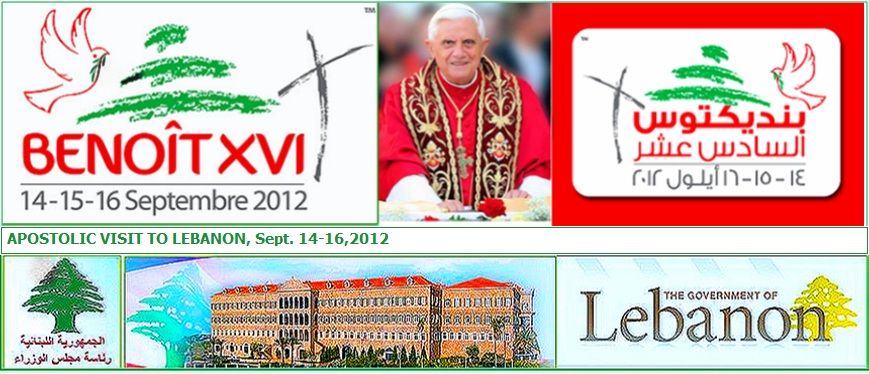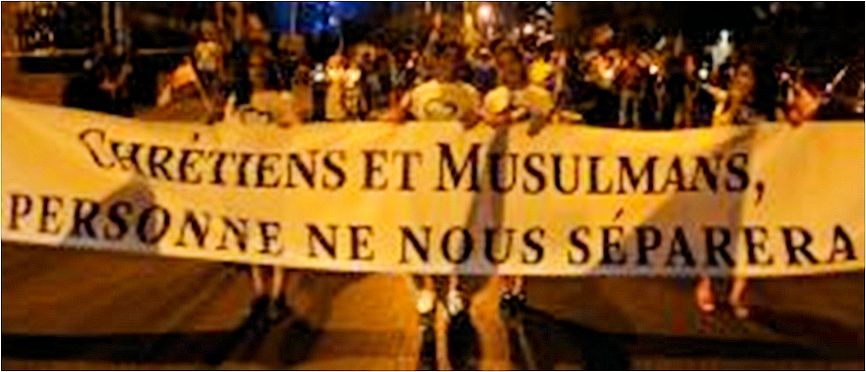 There may be an unjustified new wave of anti-Americanism in the Muslim world these days - in which the US government is irrationally blamed for the entirely free personal action of one American citizen who made an allegedly anti-Islam film - but judging from all the reports coming from Lebanon, the hostility is not spilling over in any way to Pope Benedict XVI, who arrives in Beirut tomorrow.
There may be an unjustified new wave of anti-Americanism in the Muslim world these days - in which the US government is irrationally blamed for the entirely free personal action of one American citizen who made an allegedly anti-Islam film - but judging from all the reports coming from Lebanon, the hostility is not spilling over in any way to Pope Benedict XVI, who arrives in Beirut tomorrow.
The Muslim world was, of course, artificially inflamed by selective media reporting of the Pope's Regensburg lecture seven years ago, provoking demonstrations over several days with the Pope's effigy being burned in many Muslim cities (and sadly, an Italian nun was killed by demonstrators in Mogadishu, Somalia). But that did not stop the Pope from visiting Turkey six weeks after the lecture. Massive protests were planned during his visit but did not materialize, and he ended up captivating even the hostile Turkish media after his spontaneous gesture of pausing in silence beside an imam in front of the prayer wall at Istanbul's Blue Mosque.
And his first and only visit so far to a country with an overwhelming Muslim majority was, by all accounts, a success. So much so that the Turkish religious affairs minister who had been the first major Muslim leader to denounce the Regensburg lecture contributed a few years later to a book in which prominent people recount how their personal encounter with Benedict XVI had affected them for the better.
So, as we continue to pray for the success of this visit, for the peoples of the Middle East and for the health and safety of our beloved Pope, let us be grateful that Benedict XVI is given this chance to be a sign of hope that many in the Middle East are looking to at a time of great uncertainty and difficulty.
Christians and Muslims join
in prayer vigil for the Pope

Sept. 13, 2012
 The sign reads: "Christians and Muslims - no one will separate us".
The sign reads: "Christians and Muslims - no one will separate us".
Thousands of Christians and Muslims gathered in Beirut’s “Garden of Mary” Wednesday evening to invoke the protection of Our Lady of Lebanon for Pope Benedict XVI’s upcoming visit to their country. The Pope is due to arrive in the capital on a three day visit this Friday. Tracey McClure sent this report from Lebanon:
If you didn’t know Pope Benedict was coming to Lebanon you might be forgiven – especially if you’re not Christian or from these parts. But once you arrive in Beirut, especially at the international airport, you can’t fail to miss the posters with close ups of the smiling Pope and messages welcoming him in Arabic, French, English and Italian. Messages like “Pax vobis,” Latin for “peace be with you”.
And that is the message that Pope Benedict will be bringing with him to this region, so full of hope and desire for change from the Arab Spring yet so troubled by conflict and rife with mistrust and misunderstanding between people of different ethnic groups and religious faiths.
But ever the land of contrasts, Lebanon offers a very different picture. Despite lingering tensions since its 1975-1990 civil war, the country’s 18 major religious groups generally respect each other and enjoy similar civil rights and freedoms.
Here in Beirut Wednesday night, thousands turned out for another kind of demonstration: one of love and hope as Muslims joined Christians to pray and entrust to Our Lady Pope Benedict’s weekend visit.
Crossing the wartime Green Line, the site of bitter and bloody battles between them, Christians and Muslims found themselves together, praying and calling for a different future where barriers such as these will remain only vague memories.
Tracey McClure later spoke to the Apostolic Nuncio in Beirut, Archbishop Gabriele Caccia:
“Yesterday in Beirut, Christians and Muslims came together to pray -that’s the best answer that Lebanon could give to the situation around the region and the whole world these days”, says Pope Benedict XVI’s representative in Lebanon, Archbishop Gabriele Caccia.
The Nuncio reflected on Lebanon’s role as a message of peaceful coexistence between people of different religious and cultural backgrounds in the one nationhood.
What are your hopes regarding the situation in Syria today?
The Holy Father has intervened many times over the past months and even recently on Sunday, saying. "Stop the violence!" That’s the first measure needed for the people. We can’t just look at what’s going on, without trying to do something. There is a tragic humanitarian situation that needs to be addressed and the Holy Father is asking everyone to stop the violence.
And to find a way through dialogue is the answer to the legitimate aspirations of the people of Syria in a way which also gives guarantees to all its components for a better society. Of course the situation in Syria depends also on the balance of powers in the region and the good will of the international community as a whole.
We know that there is a new distribution of powers in this region and so, unless all the actors on the international, regional and local levels take part, there will be no answer to the situation in Syria.
Pope John Paul used to call Lebanon “a message of pluralism and coexistence among peoples of different faiths”… yet the country has struggled with tensions remaining from its civil war years and from outside pressures… What future do you hope to see for the Land of the Cedars?
The message of Blessed John Paul II came after a long experience of division, but recalling the long, long tradition of Lebanon, of respect, of freedom. And so when he said the famous sentence “Lebanon is more than a message, both for the West and the East,” he was stating the main mission of this country.
Even now Lebanon has learned from its own suffering and divisions that in civil conflicts, no one is a winner, everyone is a loser. That is why even in this difficult moment for the region, Lebanon is trying to find the unity to respond positively to the situation, while avoiding conflicts among each other.
It is very important for Lebanon to be seen as an example of a country where diversity and communion are possible at all levels of society. The President of this country is Christian – the only one in the whole region. The deputy and his ministers are half Muslims, half Christians. There is no discrimination. That’s the beauty of Lebanon: diversity, respect, freedom and unity”.
Voices of hope raised these days come especially from Christian religious leaders in Lebanon and other parts of the Middle East.
 Maronite Patriarch calls for
Maronite Patriarch calls for
a 'Christian spring' in the Mideast
“The language of hatred and violence, both regionally and internationally, will never bring about a new spring, only the opposite,” says Patriarch of the Maronie Church based in Lebanon, Beshara Boutros al-Rai.
On the eve of Pope Benedict XVI’s arrival in Lebanon for a widely anticipated three-day apostolic visit, the leader of the largest Christian denomination in the Land of the Cedars spoke to Vatican Radio’s Tracey McClure about the focal point of this Papal trip: The Churches of the Middle East and how they can and must contribute to a future of peace in the region.
“I think the Apostolic Exhortation is a gift of Divine Providence in this difficult moment. It will present a series of challenges confronting the Christians of the region and propose some solutions and a way to proceed”, he said.
Patriarch Rai says that the Muslim community is also “very enthusiastic about the Pope’s visit. “The Pope will help bring the dawn of peace to the region. But the real Arab Spring will arrive as the fruit of a Christian Spring and we can help to achieve this through communion and witness to love”.
“This is a region torn by conflict and war and this exhortation will present a new way of presenting positive solutions to the conflict and political tensions. It is important that the Church speaks a language of peace, dialogue and understanding, because the Arab world only hears the language of hatred and violence both regionally and internationally, unfortunately. Violence and war will never bring about a new Spring. Only the opposite”.

Tracey McClure also interviewed Patriarch Ignace Joseph III Younan, the leader of the Syrian Catholic Church of the Antiochian Tradition whose Patriarchal See is based in Lebanon.
The Patriarch offered a brief overview of this Church which originated in Syria, whose people are experiencing one of the darkest chapters in this nation's history.
"Until what the West likes to call the Arab Spring, Christians were living in Syria relatively in peace, their Church was respected in the same way as other Churches because there was a secular regime in place..."
The Patricarch then highlights how despite this relatively peaceful situation, Middle East Christians outrside of Lebanon never enjoyed full citizenship privileges as the Muslim majority.
Now, following the upheavals inthe Arab world since earlyy 2011, the Patriarch says there is great concern not just for Syriac cAtholoics but for all Christians across Syria: "We are really frightened that another exodus like the one we witnessed in Iraq will take place in Syria.."

[Modificato da TERESA BENEDETTA 13/09/2012 23:22]